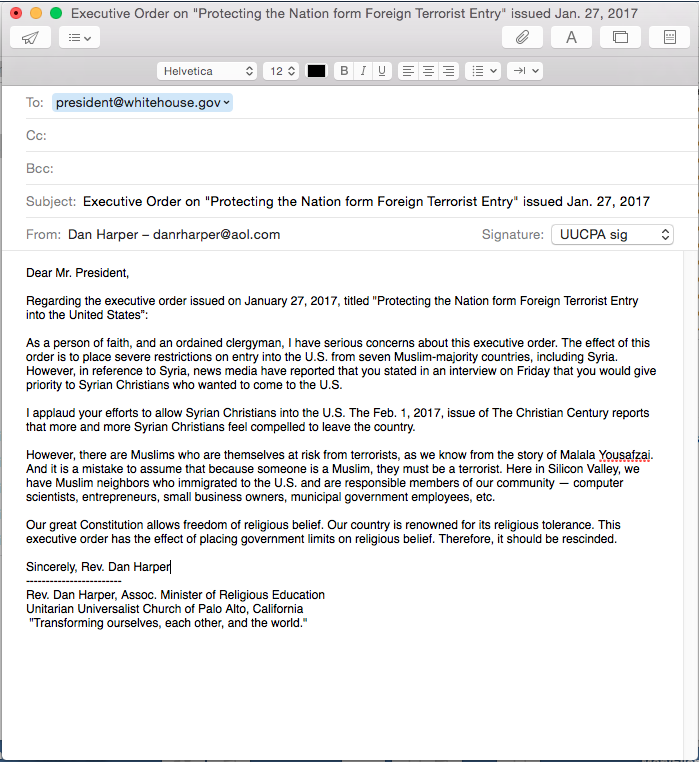The BBC has posted the full text of Trump’s executive order titled “Protecting the Nation from Foreign Terrorist Entry into the United States” here.
The executive order states in part: “The United States cannot, and should not, admit those who do not support the Constitution, or those who would place violent ideologies over American law.” By the same logic, the executive order itself should support the Constitution, including the right to religious belief set forth in the First Amendment, viz.: “Congress shall make no law respecting an establishment of religion, or prohibiting the free exercise thereof.”
What is particularly problematic here is that Trump, like both his presidential predecessors, is using executive orders too broadly. This particular executive order has the effect of proscribing persons with certain religious beliefs, notwithstanding that the courts have generally held that, while certain destructive religious practices (e.g., Hindu suttee, human sacrifice, etc.) can be prohibited by law, religious beliefs cannot be regulated by Congress. Trump’s use of a presidential executive order can be seen as an attempted end run around the First Amendment. US District Judge Ann Donnelly has issued a temporary stay of the executive order, though she did not attempt to rule on its constitutionality — that will be left to another court.
Although Trump has stated that this executive order does not target specific religious groups (i.e., Muslims), the effect of the order is to severely limit the admission of Muslims into the United States; under the order, no visas will be issued to nationals of seven countries, including Syria, Iran, Iraq, Yemen and Libya, all of which are Muslim-majority countries, according to the BBC. Furthermore, the BBC notes that in an interview of Friday, Trump specifically said that Christians “would be given priority among Syrians who apply for refugee status in the future” (BBC’s paraphrase), thus implying that the government gives preference to certain religions.
All people belonging to faith communities should be wary of this executive order; we have a vested interest in maintaining freedom of our religious beliefs in the United States, and this executive order is a definite step towards establishing state-sanctioned religious beliefs, insofar as it brands certain beliefs as not acceptable. As noted previously, Trump has indicated that Christian refugees will be considered exceptions under this executive order, but Christians should also be worried, unless you’re sure that you hold exactly the right kind of Christian belief that will receive government sanction. Atheists and agnostics, you too should be worried about the creeping establishment of government-approved religion!
Write to Trump right now to express your concern. You can send your email to president@whitehouse.gov — if you prefer to send classic mail, address your letter to:
The President
The White House
1600 Pennsylvania Avenue NW
Washington, DC 20500
Do this RIGHT NOW. Then tell ten friends to write letters as well. Let’s make sure the White House receives a million or more letters opposing this executive order within a week.
I’ll put the text of my email below, along with a sample email you can tweak for yourself….
Sample email
Dear Mr. President,
Regarding the executive order issued on January 27, 2017, titled “Protecting the Nation form Foreign Terrorist Entry into the United States”:
As a person of faith, I have serious concerns about this executive order. The effect of this order is to place severe restrictions on entry into the U.S. from seven Muslim-majority countries, including Syria. However, in reference to Syria, news media have reported that you stated in an interview on Friday that you would give priority to Syrian Christians who wanted to come to the U.S.
I support efforts to allow Syrian Christian refugees into the U.S., since many of them are in danger. But we know from the story of Malala Yousafzai that there are Muslims who are themselves in danger from terrorists. And many Muslim immigrants become good U.S. citizens. Here where I live, we have Muslim neighbors who immigrated to the U.S. and are responsible members of our community.
Our great Constitution allows freedom of religious belief. Our country is renowned for its religious tolerance. This executive order has the effect of placing government limits on religious belief. Therefore, it should be rescinded.
Sincerely, [insert your name]
My own email
Dear Mr. President,
Regarding the executive order issued on January 27, 2017, titled “Protecting the Nation form Foreign Terrorist Entry into the United States”:
As a person of faith, and an ordained clergyman, I have serious concerns about this executive order. The effect of this order is to place severe restrictions on entry into the U.S. from seven Muslim-majority countries, including Syria. However, in reference to Syria, news media have reported that you stated in an interview on Friday that you would give priority to Syrian Christians who wanted to come to the U.S.
I applaud your efforts to allow Syrian Christians into the U.S. The Feb. 1, 2017, issue of The Christian Century reports that more and more Syrian Christians feel compelled to leave the country.
However, there are Muslims who are themselves at risk from terrorists, as we know from the story of Malala Yousafzai. And it is a mistake to assume that because someone is a Muslim, they must be a terrorist. Here in Silicon Valley, we have Muslim neighbors who immigrated to the U.S. and are responsible members of our community — computer scientists, entrepreneurs, small business owners, municipal government employees, etc.
Our great Constitution allows freedom of religious belief. Our country is renowned for its religious tolerance. This executive order has the effect of placing government limits on religious belief. Therefore, it should be rescinded.
Sincerely, Rev. Dan Harper
————————
Rev. Dan Harper, Assoc. Minister of Religious Education
Unitarian Universalist Church of Palo Alto, California
“Transforming ourselves, each other, and the world.”

